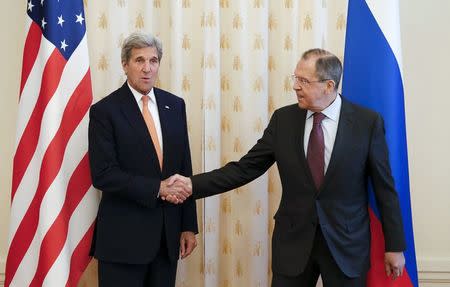Russia, U.S. agree to speed up Syria peace effort

By Lesley Wroughton and Denis Dyomkin MOSCOW (Reuters) - Russia and the United States agreed at talks in Moscow on Thursday to use their influence over the sides in the Syria conflict to speed up progress toward a political solution. Speaking after a four-hour meeting with Russian President Vladimir Putin, U.S. Secretary of State John Kerry said Moscow and Washington would try in the next few days to nudge Syrian leader Bashar al-Assad to "make the right decision" about committing fully to peace talks. Negotiations in Geneva between representatives of the Syrian government and opposition are bogged down, and Washington believes that Moscow, closely allied to Assad, can convince Damascus to make concessions. The main stumbling block is whether Syria's political transition will lead to Assad leaving office. His opponents and Western governments say he must go, but Damascus says that is not even on the agenda for negotiations. "Russia will have to speak itself as to what it is going to choose to do in order to help Mr Assad make the right decisions, but we agreed today that we will accelerate the effort to try to move the political process forward," Kerry told a news conference after his talks with Putin. "I believe that Russia is fully engaged in this effort and all of us are going to try and get President Assad to make the right decision over these next days to engage in a political process that results in a genuine transition" and brings peace to Syria," Kerry said. However, Russian Foreign Minister Sergei Lavrov, who appeared alongside Kerry at the news conference in the Kremlin, did not say in his remarks if Russia was prepared to apply any pressure specifically on Assad. He said only that Russia would encourage all sides to commit to the principles of the talks in Geneva, which are being brokered by the United Nations. "Perhaps the most important thing at this stage: we agreed to increase efforts to establish the necessary conditions for a political process," Lavrov said. "The political process should end with the Syrians themselves agreeing on how they want to see their country.” "As for the most immediate tasks, we have agreed to work towards a speedy start of direct talks in Geneva between the government delegation and a whole specter of the opposition," Lavrov told reporters. Both Kerry and Lavrov said they agreed to take immediate steps to reinforce the cessation of hostilities and halt attempts by warring parties to seize new territory, to push for expanded humanitarian access to all parts of Syria, and for the government and opposition to start releasing detainees starting with the most vulnerable. COMMON GROUND The atmosphere at the talks was less frosty than in previous encounters. Putin cracked jokes, and afterwards, both Kerry and the Russian foreign minister tried to accentuate the common ground in their relationship, rather than their many differences. They said they agreed to keep working together to resolve the conflict in eastern Ukraine between Kiev's forces and pro-Moscow separatists. Kerry said he raised with Putin the issue of Nadezhda Savchenko, a Ukrainian pilot in a Russian jail after she was convicted of complicity in the deaths of two Russian journalists during the separatist conflict. Kiev says she was the victim of a show trial. Lavrov said he obtained an agreement from Kerry to launch a dialogue about the U.S. missile defense shield in eastern Europe. Moscow argues the system is a threat to its security. Kerry arrived in Moscow 10 days after Putin announced he was withdrawing the bulk of Russia's military force in Syria, a decision Western governments see as an opportunity to draw a line under the fighting and push ahead with peace talks. Russia and the United States have emerged as the two outside powers with a decisive say in what happens next in Syria's five year-old civil conflict. The United States and its allies have been backing armed groups that rose up against Assad's rule, while Moscow has asserted its role with a five-month military campaign that turned the tide of the fighting in Assad's favor. Western diplomats have said the government delegation in Syria is so far prepared only to talk about procedures for negotiations and has resisted attempts to broach the future of President Assad. At the start of the meeting in the Kremlin, Putin made an attempt at levity, joshing Kerry over the fact that he carried his own luggage as he stepped off his plane on arrival in Moscow. "There was something in that briefcase of yours you couldn't trust someone else with. Have you brought some money with you?" Putin said, to laughter from Kerry and the rest of the officials in the room. Kerry responded: "When we have a private moment I will show you what is in that briefcase and I think you'd be surprised...pleasantly." (Writing by Christian Lowe; editing by Lidia Kelly)

